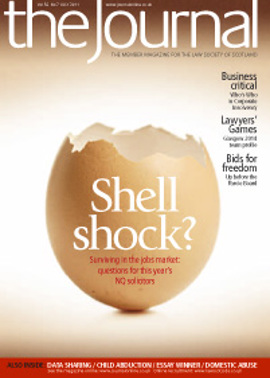Sheriff court auditor role to be restricted
A delegation from the Society met with civil servants in the Justice Directorate on 20 May to discuss aspects of the work currently done by sheriff court auditors.
The Society was advised that from 30 April 2012, those sheriff court auditors who are employed by Scottish Court Service will be barred from undertaking private work, either in relation to assessing fees at the request of solicitors or extrajudicial taxations on a joint remit from solicitor and client. Auditors who are not employed by Scottish Court Service, including those in Edinburgh and Glasgow, will continue to be able to offer such services.
All sheriff court auditors will continue to tax judicial accounts.
Firms whose terms of engagement state that fees will be assessed by the auditor of court should review those now, particularly in relation to executry work. Files could be sent to external law accountants for feeing.
In regard to extrajudicial taxation of fee notes which have been challenged by the client, or where there is a joint remit, it was made clear that this will not be done through Scottish Court Service, but it was suggested that it be done by the Society through its Regulatory Committee which, in terms of s 133 of the Legal Services (Scotland) Act 2010, is responsible from 1 June 2011 for all the regulatory functions of the Society. The committee has 50% solicitor and 50% lay membership and is chaired by someone who is not a solicitor. It will be able to set up subcommittees, which will also require to be 50/50 solicitor/non-solicitor in membership. These could include a subcommittee responsible for supervising taxation of accounts.
This will require to be discussed more fully, and the policy would have to be agreed by Council as well as the Regulatory Committee. However it should be possible to draw up a list of persons (including law accountants and the auditors of Edinburgh and Glasgow Sheriff Courts) who will be available to tax accounts on written representations. Their fees for doing so would be paid by the solicitor or client depending on the outcome of the taxation, just as at present. The Society’s guidance on terms of business letters could be extended to include a reference to such an arrangement. The people carrying out the taxation would need to be conflicted from taxing an account of a firm from whom they receive private feepaying work.
The Government is looking for a solution to be in place by April 2012.
In this issue
- Employee ownership: untapped succession solution for legal firms
- Cash call: cornering the council tax
- Tobacco Act sound
- Public profile
- Too much heat, not enough light
- Newly hatched
- Money matters
- Families in fear
- Get out of jail?
- People's choice
- E for explanation
- Who's Who in Corporate Insolvency
- Care with sensitive case papers
- Bullying: time to crack down
- SYLA reports successful year
- Middle East: back to growth
- Sheriff court auditor role to be restricted
- Law reform update
- From the Brussels office
- Solicitor's guide to internet porn
- Ask Ash
- Data sharing – the good practice guide
- Legal Risks – a conference reviewed
- Long-term solutions
- Removing hardship?
- 18 or 21?
- Lenders in the shade
- Demolition derby
- Time to come clean
- Scottish Solicitors' Discipline Tribunal
- Website review
- Book reviews
- Going the distance
- Fashion retailing comes to court






